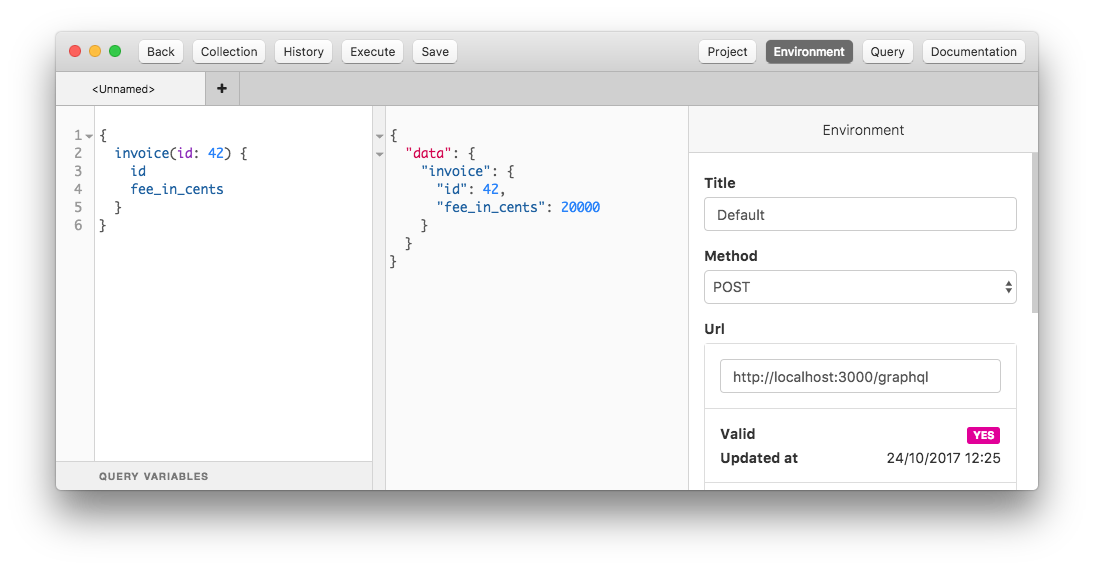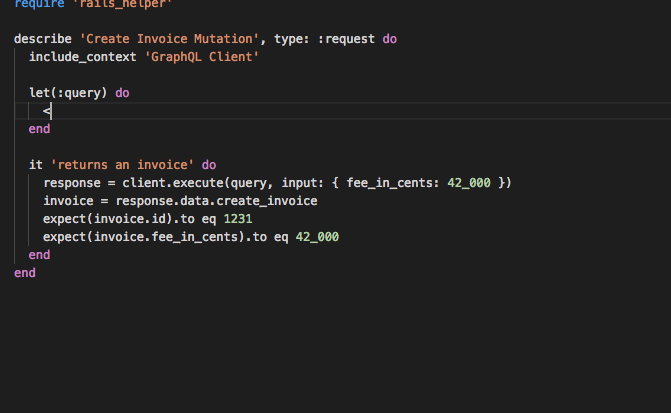In the past few weeks I’ve convinced myself that GraphQL can work well for any micro-service. This post is a full walk-through of getting a working GraphQL API on Ruby on Rails. This should help you get started, especially if you’ve never written a line of GraphQL in your life. The code for this post is dblock/graphql-invoices.
Prerequisites
Make a bare Rails API app with rails new --api, get RSpec and RuboCop. See @c26b0e18.
GraphQL
Add gem 'graphql' to the project.
This is the graphql-ruby library, an implementation of GraphQL in Ruby and is what is used for building a GraphQL endpoint on the server. See @7649ba2b.
Defining Schema
This project will implement a dummy invoice API where clients can get invoices and create invoices.
The invoice type has an ID and some fees in cents and goes into app/graphql/types/invoice.rb.
InvoiceType = GraphQL::ObjectType.define do
name 'Invoice'
description 'An Invoice'
field :id, !types.Int
field :fee_in_cents, types.Int
end
The GraphQL ID type is a string, so we use Int.
GraphQL defines a schema with queries (eg. get invoices) and mutations (eg. create an invoice), which typically goes into app/graphql/schema.rb.
Schema = GraphQL::Schema.define do
query Query
mutation Mutation
end
The query root returns an invoice by ID, implemented in app/graphql/queries.rb. Notice that this takes an Int (ID) and returns our InvoiceType.
Query = GraphQL::ObjectType.define do
name 'Query'
field :invoice, InvoiceType do
argument :id, !types.Int
description 'Get an invoice by ID.'
resolve ->(_obj, args, _ctx) {
OpenStruct.new(
id: args[:id],
fee_in_cents: 20_000
)
}
end
end
A mutation creates invoices in app/graphql/mutations/create_invoice_mutation.rb. Use Relay, a data fetching framework, that makes it easy.
CreateInvoiceMutation = GraphQL::Relay::Mutation.define do
name 'createInvoice'
input_field :fee_in_cents, !types.Int
return_type InvoiceType
resolve ->(_object, inputs, _ctx) {
OpenStruct.new(
id: 1231,
fee_in_cents: inputs[:fee_in_cents]
)
}
end
This mutation was referenced from the root schema above and is linked from app/graphql/mutations.rb.
Mutation = GraphQL::ObjectType.define do
name 'Mutation'
field :createInvoice, field: CreateInvoiceMutation.field
end
GraphQL Controller
GraphQL accepts a single JSON payload via POST in a typical Rails controller in app/controllers/graphql_controller.rb.
class GraphqlController < ApplicationController
def execute
result = Schema.execute(
query,
variables: variables,
context: context,
operation_name: operation_name
)
render json: result
end
private
def query
params[:query]
end
def operation_name
params[:operationName]
end
def context
{}
end
def variables
params[:variables] || {}
end
end
The controlled needs to be routed to in config/routes.rb.
Rails.application.routes.draw do
post '/graphql', to: 'graphql#execute'
end
GraphQL IDEs
The best way to try our app out is to use a GraphQL IDE. Run the Rails application with rails s and point the IDE to https://localhost:3000/graphql.

You can use various clients to consume the API from our applications, including graphlient or graphql-client.
Tests
Add graphlient, which is a small library built on top of graphql-client and that’s a bit easier to use.
Define a shared client context in spec/support/graphql/client.rb.
require 'graphlient'
RSpec.shared_context "GraphQL Client", shared_context: :metadata do
let(:client) do
Graphlient::Client.new('https://api.example.org/graphql') do |client|
client.http do |h|
h.connection do |c|
c.use Faraday::Adapter::Rack, app
end
end
end
end
end
The client can fetch the schema in spec/graphql/schema_spec.rb.
require 'rails_helper'
describe 'GraphQL Schema', type: 'request' do
include_context 'GraphQL Client'
it 'retrieves schema' do
expect(client.schema).to be_a GraphQL::Schema
end
end
Fetch an invoice in spec/graphql/queries/invoice_query_spec.rb.
require 'rails_helper'
describe 'Invoice Query', type: :request do
include_context 'GraphQL Client'
let(:query) do
<<-GRAPHQL
query($id: Int!) {
invoice(id: $id) {
id
fee_in_cents
}
}
GRAPHQL
end
it 'returns an invoice' do
response = client.execute(query, id: 42)
invoice = response.data.invoice
expect(invoice.id).to eq 42
expect(invoice.fee_in_cents).to eq 20_000
end
end
Create an invoice in spec/graphql/mutations/create_invoice_mutation_spec.rb.
require 'rails_helper'
describe 'Create Invoice Mutation', type: :request do
include_context 'GraphQL Client'
let(:query) do
<<-GRAPHQL
mutation($input: createInvoiceInput!) {
createInvoice(input: $input) {
id
fee_in_cents
}
}
GRAPHQL
end
it 'returns an invoice' do
response = client.execute(query, input: { fee_in_cents: 42_000 })
invoice = response.data.create_invoice
expect(invoice.id).to eq 1231
expect(invoice.fee_in_cents).to eq 42_000
end
end
Tooling
GraphQL comes with some impressive tooling and IDE integration, such as with Visual Studio Code via graphql-for-vscode.
Add a Rake task to dump the project’s schema to lib/tasks/graphql/schema.rake.
namespace :graphql do
namespace :schema do
directory 'data'
desc 'Dump GraphQL API schema to data/schema.graphql.'
task dump: [:environment, 'data'] do
File.open('data/schema.graphql', 'w') do |f|
f.write(Schema.to_definition)
puts "Dumped schema to #{f.path}."
end
end
end
end
Add a configuration file, .gqlconfig
{
"schema": {
"files": "data/schema.graphql"
},
"query": {
"files": [
{
"match": "spec/graphql/**/*.rb",
"parser": ["EmbeddedQueryParser", { "startTag": "<<-GRAPHQL", "endTag": "GRAPHQL" }]
}
]
}
}
Install prerequisites for graphql-for-vscode.
brew update
brew install watchman
npm install @playlyfe/gql
Install graphql-for-vscode from the Visual Studio Code Marketplace, here.

Generating and Handling Errors
Read Generating and Handling Errors in GraphQL in Ruby next.

